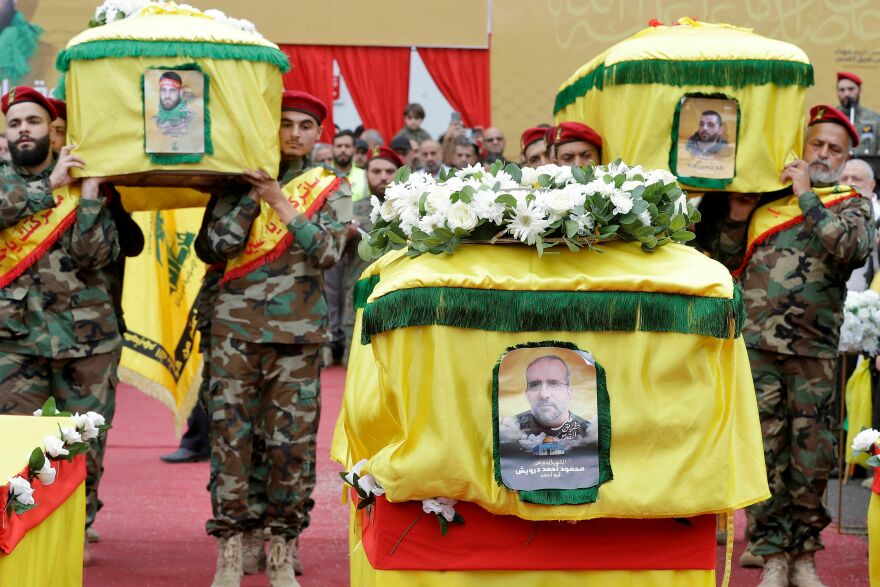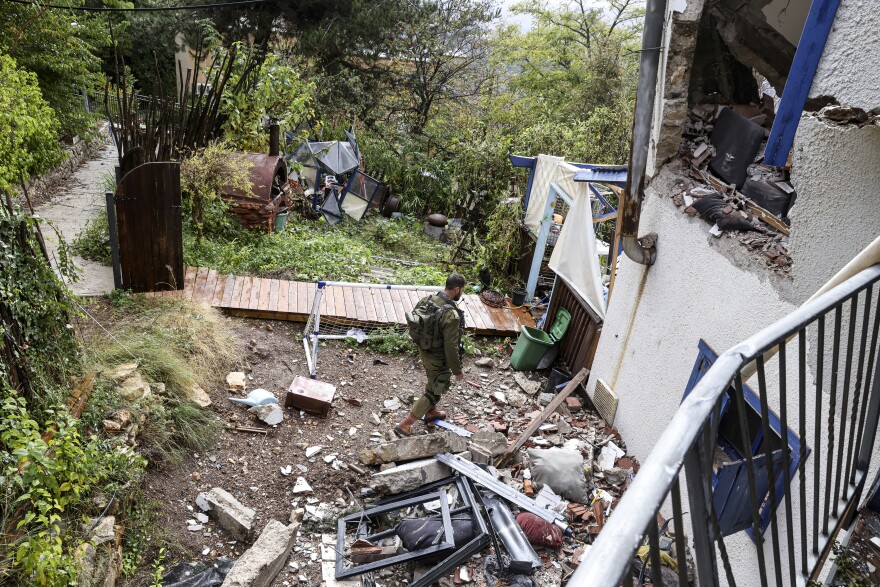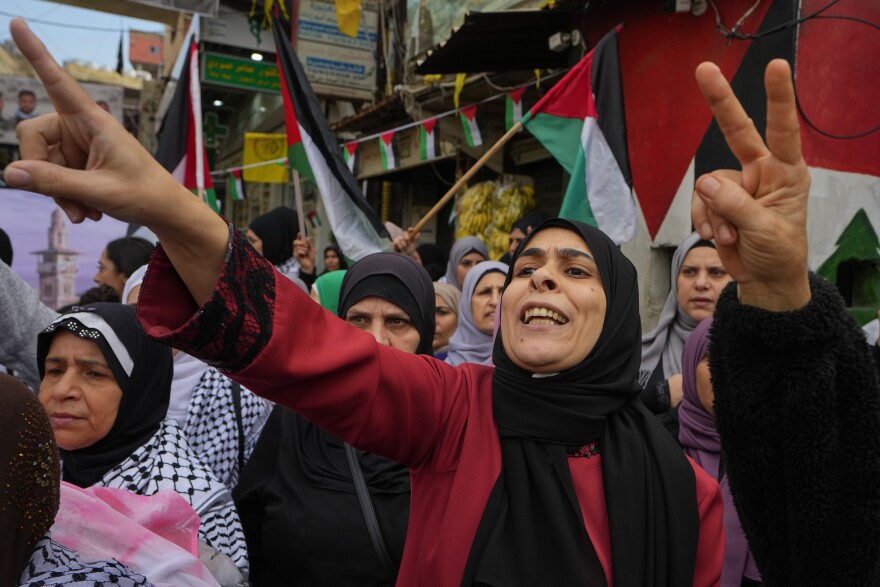BEIRUT — When the war in Gaza began in early October, it also broke a 17-year stretch of relative calm across the Lebanese-Israeli border, raising fears of a second front plunging the region into a wider conflict.
In 2006, the killing and kidnapping of Israeli soldiers by Hezbollah, the Iran-backed Lebanese militia, sparked a 34-day war that killed more than 1,100 Lebanese and 165 Israelis, and heavily damaged Lebanon's infrastructure.
Attacks in the following years were sporadic enough that the United Nations peacekeeping force along the border believed the next step could be a permanent cease-fire.
And then came Oct 7.
The Hamas attack that day from Gaza into southern Israel has been followed by a war between the militant Palestinian group and Israeli forces that so far has killed more than 19,000 Palestinians, most of them women and children, according to Gaza's health ministry. Israel says about 1,200 people were killed in the Oct. 7 attack.
After the Gaza war started, Hezbollah responded by attacking Israeli targets in northern Israel.
Hezbollah insists it did not know in advance of the Oct. 7 Hamas attack. It has traded attacks with Israel in a relatively narrow zone across Israel's northern border in an effort to tie up Israeli military resources that would otherwise be deployed in Gaza.
Hezbollah, a Shia Muslim movement, was founded after Israel's 1982 invasion of Lebanon. Although it supports Hamas, which is predominantly Sunni Muslim, it is not believed to carry out extensive coordination with the Palestinian group.
Israeli Prime Minister Benjamin Netanyahu has threatened to turn southern Lebanon and Beirut "into Gaza" if Hezbollah declares all-out war on Israel. Israeli forces in Gaza have flattened entire city blocks, bombed hospitals and heavily damaged infrastructure.
Analysts say both Israel and Hezbollah, along with Iran, would like to avoid all-out war. Here are keys to understanding why all three would prefer to avoid an escalation — and why they may not be able to.
Israel-Hezbollah fighting remains localized for now
Except during a week-long cease-fire last month, Israel and Hezbollah have launched multiple attacks every day across the Israel-Lebanon border since Oct. 8.
Those attacks have been largely confined to a swath of land three to four miles deep on each side of the border, despite the capability on both sides to reach much farther.
Hezbollah says 94 of its fighters have been killed near the Lebanese border by Israeli strikes, and the Lebanese military says one Lebanese soldier has been killed. Lebanese media report at least 17 civilians have been killed.

Three of them were journalists or media workers, including Reuters visuals journalist Issam Abdallah, who was killed by a tank round in what a Reuters investigation said appeared to be a targeted attack. Israel says at least 11 soldiers and civilians have been killed on the Israeli side of the border.
The fighting "overall has been very, very localized. That also shows somehow that there is not a real appetite for wider conflict in this region," says Andrea Tenenti, spokesperson for the United Nations Interim Force in Lebanon, or UNIFIL. The peacekeeping force was established 45 years ago to oversee Israel's withdrawal that year after it invaded Lebanon following Palestinian commando attacks.
Tenenti says both Israel and Hezbollah have unfailingly accepted messages passed through UNIFIL in procedures designed to deescalate potentially dangerous misunderstandings — a further sign of the desire to avoid wider conflict.
UNIFIL does not deal directly with Hezbollah, which the U.S. designates as a terrorist organization, but coordinates with the Lebanese Army.
Tenenti describes increased attacks earlier this month as part of a pattern of sporadic escalation rather than a signal that the entire border conflict had intensified.
He and several analysts say, however, that it would take only one incident — the killing of a large number of civilians, for instance — to unintentionally escalate the conflict.
"In my view, Hezbollah is going to maintain the tempo of firing into northern Israel to demonstrate its 'resistance' credentials and show solidarity with the Palestinians, but not attempt to do anything that would provoke full-scale war with the Israelis," says Jeffrey Feltman, a former U.S. assistant secretary of state and U.N. undersecretary general.
"After all, the primary purpose of Hezbollah's massive arsenal is to deter Israel from a massive strike on Iran or to retaliate in case of such a strike," says Feltman, now a fellow at the Brookings Institution.
Much is at stake for Hezbollah and its backer, Iran
Hezbollah is considered by security analyststo be one of the most heavily armed paramilitaries in the world. Its leader Hassan Nasrallah has said the militia possesses rockets that can reach all parts of Israel and is increasingly using precision guidance systems for targeting. Iran is the group's major supplier of weapons.
"Full-scale confrontation between Israel and Hezbollah" is too high a price for Iran to pay, says Raz Zimmt, with the Moshe Dayan Institute for Middle Eastern and African Studies at Tel Aviv University. "It's just not worthwhile, at least for now." He believes Iran has assessed that Hamas does not now require intervention.
"The rules Hezbollah has been following until now ... are more acting in reaction to Israeli escalation, rather than engaging in escalation on its own," says Randa Slim,Beirut-based senior fellow with theMiddle East Institute.
"They don't want to be seen as dragging Lebanon into all-out war now," she says, citing Lebanon's deep financial crisis and political paralysis.
Lebanon's economy has contracted over the past four years while the value of its currency continues to fall and poverty increases amid what the World Bank says is one of the highest inflation rates in the world. Economic and financial reforms have been stalled by a political crisis that has left the fragmented country without a president for more than a year.
In addition to its armed force, Hezbollah also has a powerful political wing that is part of the Lebanese government.
Hezbollah wants to avoid being blamed by the Lebanese public for exposing the country to another war, says Feltman.
"But this is an extremely dangerous game," he says. "Hezbollah could easily miscalculate, misread Israeli red lines and invite the very destruction its arms are in part intended to deter."

Both Iran and Hezbollah have insisted they were not informed in advance of the Oct. 7 Hamas attacks in Israel. Hezbollah has made clear that its goal in the cross-border attacks is to tie up Israeli military resources that would otherwise be used in Gaza.
And Iran's priority in avoiding a wider war seems to be not jeopardizing a historic détente agreement reached earlier this year with traditional Sunni Arab rival Saudi Arabia, says Slim. The two countries' agreement to establish diplomatic ties after years of animosity was an important step for Iran, which has been isolated internationally and largely isolated from the Arab world.
"I think there is some kind of status quo that they have now established, especially in their relationship with Saudi Arabia. They feel that any escalation will upend that," Slim says.
In a speech in November,Hezbollah's reclusive leader told followers that their battle with Israel would be won by incremental gains.
"It may seem modest to some who expect or demand that Hezbollah quickly enter a full war with the enemy," Hassan Nasrallah said of attacks across the Lebanese border. "We still need time, to be realistic," he said, "but we win and achieve victory by points."
What might end up sparking a wider war?
Despite the apparent reluctance by Iran and Hezbollah to significantly escalate the conflict, Slim says, they could take a different tack if Israel tries to push Hezbollah forces further from the border in line with a 2006 U.N. Security Council resolution that ended war with Israel.
The Security Council resolution called for Hezbollah to retreat north of the Litani River in Lebanon — more than 10 miles from its existing positions. That resolution envisioned the Lebanese Army, which is weaker and less well-equipped than Hezbollah, replacing the militia.
Israel's Defense Minister Yoav Gallant told mayors of northern Israeli towns earlier this month that if the Security Council does not reinforce the resolution, Israel is prepared to physically push Hezbollah back, according to Israeli media.
Israel has evacuated tens of thousands of villagers from near the border with Lebanon. Tens of thousands of Lebanesehave also fled their homes.
While support for Hezbollah is strong in Lebanon, particularly in the largely Shia Muslim south, it does not enjoy universal backing across the country. Lebanon is a mosaic of ethnic and religious groups — and increasingly, citizens who place stability over personal identity. Yet the daily images of Israeli destruction and Palestinians killed in Gaza are swaying public opinion.

At a rally near the Martyrs' Monument in downtown Beirut on Dec. 11, a small group of women held aloft Palestinian flags in solidarity with a global strike called by Palestinian groups to press for a cease-fire in Gaza. The Lebanese government ordered public offices, banks and schools closed to support the call.
"We all fear war and we are all desperate, but for us now it's the genocide in Gaza that needs to stop," said Dania Dandashli, a psychologist. "We are concerned about the escalation in Lebanon, but if this is going to turn into a regional war, I'm thinking, let it be."
NPR's Scott Neuman contributed reporting from Tel Aviv, Israel.
Copyright 2023 NPR. To see more, visit https://www.npr.org. 9(MDM3NjYwMjA5MDE1MjA1MzQ1NDk1N2ZmZQ004))



